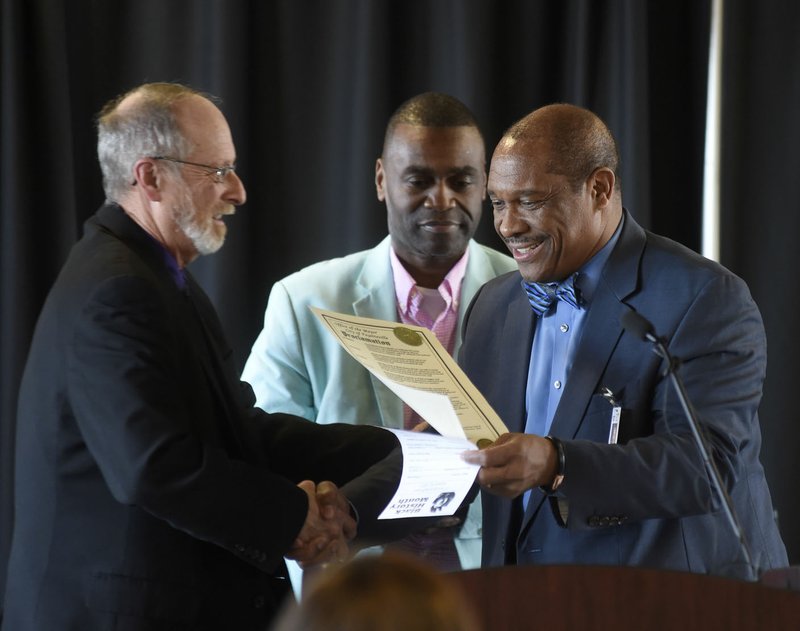FAYETTEVILLE -- It was right for the School Board on May 21, 1954, to vote unanimously for all schools to admit black students, Superintendent Matthew Wendt said.
The Fayetteville board decision was made four days after the landmark U.S. Supreme Court ruling in Brown v. the Board of Education of Topeka, Kan., that segregated schools were unconstitutional.
Black History Month
• Begins Feb. 1
• Focuses on the contributions black Americans to nation’s history through their struggles for freedom and equality
• Month grew out of efforts of Carter G. Woodson, who founded what is now the Association for the Study of African American Life and History. Woodson initiated a weeklong event in February 1926 that included the birthdays of Abraham Lincoln and Frederick Douglass, two key figures in the history of black Americans.
• Since 1996, presidents have issued annual proclamations for the month.
Source: Library of Congress at loc.gov
Wendt shared that piece of history in his remarks during a Compassion Fayetteville event Tuesday marking the beginning of the city's recognition of Black History Month.
The Fayetteville School District was among the first districts in the state to desegregate he said.
Wendt, who became Fayetteville superintendent in July, told of efforts he made in a previous school district to increase the number of staff members from minority races and to reverse a trend of more black students playing football than taking Advanced Placement courses.
"It is a matter of what is right," Wendt said. "I love Fayetteville. Don't you? I love that we can work together and be together."
Mayor Lioneld Jordan and Steve Clark, executive officer and president for the Fayetteville Chamber of Commerce, shared a commitment to Fayetteville being a community of inclusion.
It's a community D'Andre Jones, a co-leader of Compassion Fayetteville, described as a "diversity gem of the south." One reason is because Fayetteville is the only community Jones has found in Arkansas to have city and school leaders promoting Black History Month.
"Fayetteville is inclusive of people of all walks of life. I feel included and accepted," said Jones, a black man who has leadership roles in several organizations that focus on making sure all people are treated fairly and with respect.
Progress toward inclusion, though, so far has not resulted in a black person being elected to city government, and few businesses are owned by black men and women, Jones said.
Jones recognized Wesley Whitmore as having the oldest black-owned business in the city, Wes's BBQ & Burgers, 14 S. University Ave. Whitmore was among several black men and women recognized for owning businesses in the city.
Whitmore is in his 32nd year with the business he started with the experience he gained while working in other restaurants, he said. He started on the University of Arkansas campus and began to reach out into the community.
His advice to young black men and women who want to own a business is to "go for it."
One of those young black men is Brandon Watts, who started B.Watts Photography two years ago. His business focuses on weddings, engagements, portraits, head shots and corporate events.
Family photos helped Watts feel connected to relatives who died before he had a chance to meet them, he said. He wanted the opportunity to take photos that would last a lifetime for other families.
Watts also participates in events that uplift the culture of the black community, he said. His first gallery showing, "The Black Woman's Crown," will be featured at an event at 5 p.m. Thursday at Fayetteville Underground, 101 W. Mountain St., Suite 222.
The photos in the exhibit focus on the Afro hairstyle, Watts said. It's more than a hairstyle. He explained when slavery ended, black men and women began straightening their hair to blend in society. In the 1960s, the Afro was revived during the Civil Rights movement as a symbol of pride, encouragement and strength.
Black men and women have more opportunities today, he said.
"We have to work twice as hard for those opportunities," Watts said.
Having events during Black History Month brings people of different cultures together so they can learn from one another, he said.
The month is about inclusion for everybody, said Terry Bankston, executive director of Engage NWA, who was glad to see students from several Fayetteville schools at Tuesday's event.
"The school system is going to be very instrumental in making this year positive," Bankston said.
The transition from President Barack Obama to President Donald Trump is an opportunity for community members to have conversations and learn from one another, he said.
"We have to know who our neighbors are," he said.
NW News on 02/01/2017

